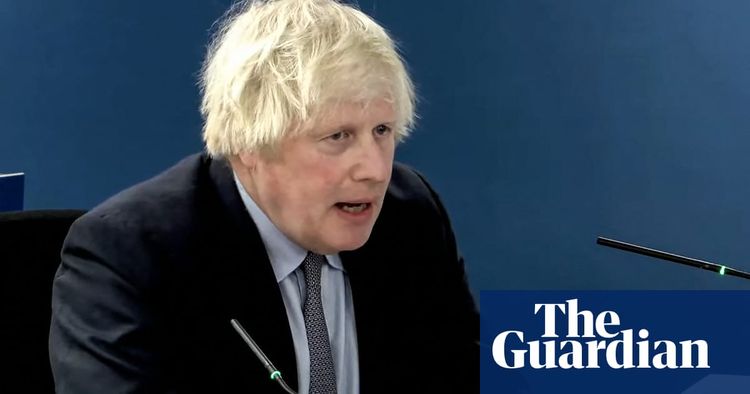Boris Johnson: I wasn’t properly warned about seriousness of Covid

Boris Johnson claimed that he did not receive sufficient early warnings about the severity of Covid in 2020. He also brushed off the negative messages exchanged among his employees as understandable given their dedication to their work.
At the Covid inquiry in London, Johnson faced a tumultuous opening as protesters were forced to leave the room. Although he expressed regret for any missteps, he defended that they were not necessarily avoidable faults.
When questioned about why he didn't take more immediate action in January and February of 2020 after potential threats were raised that Covid was quickly spreading, and had the ability to infect and kill a significant amount of people, Johnson blamed the entire government for being relaxed about the situation. He felt that their complacency was understandable, considering that previous viruses like Sars and Mers did not result in a similar outcome.
The ex-prime minister said in the investigation that upon reading the news of a possible outbreak of an Asian pandemic that may affect the world, one might feel a sense of déjà vu and that was exactly the issue.
No one informed me that this situation needed quick and prompt attention.
In February, he refused to accept the notion that he was not paying enough attention when he spent most of the half-term break at the prime minister's Chevening country house retreat while the cases were rapidly increasing. He clarified that they were not aware of the speed at which the virus was spreading and there were clear actions that they could have taken if they had known.
Despite being presented with evidence of growing concern from some government officials, including a WhatsApp message from Dominic Cummings on February 6th, in which his chief adviser informed a group including the prime minister that he was informed the virus was "likely out of control and will spread worldwide," Johnson persisted in his argument.
During the inquiry, Hugo Keith KC asked why Johnson allowed Matt Hancock, who was the health secretary at the time, to lead the initial five gatherings of the government's Cobra emergency committee for COVID-19. Johnson's response was that, at that time, the virus had not yet become a pressing political issue. He explained that no one had brought it up during prime minister's questions, and as such, it was not on his radar.
He expressed that he believes that it is an accurate statement to say that both he and those in the Whitehall establishment, which includes the scientific community and advisers, had underestimated the challenge's magnitude and speed.
Johnson stated: "As a group, we should have realized this much earlier. Personally, I should have realized it."
When the lockdown was put in place on March 23rd, Johnson explained that there were no other choices available. He mentioned that they had reached the limit of their options and couldn't wait any longer. Essentially, the situation had reached its end point.
When questioned if he had pondered the thought of not implementing a lockdown, he answered by saying that he did think about it, but he quickly dismissed the idea since his priority was to safeguard human life. He firmly believed that as the government, it was their utmost responsibility to prioritize the protection of human lives.
During the investigation, it was revealed that roughly 5,000 WhatsApp messages sent and received on Johnson’s previous phone between January and June 2020 could not be retrieved. It is suspected that the phone was reset to its original settings, causing the loss of the messages.
Johnson started his testimony which will last for two days by expressing remorse regarding the Covid victims' pain, suffering, and loss. Unfortunately, during his apology, four protestors with a sign that read "The dead can't hear your apologies" were told to leave the room by Heather Hallett, the inquiry chair.
When Keith asked Johnson some probing questions, he admitted that he was the one responsible for all the major decisions made during the pandemic. However, he did not explicitly admit that his apology implied that mistakes could have been avoided.
Keith questioned Johnson regarding his acceptance of errors, asking if he meant that the mistakes made were completely avoidable or simply that certain things could have been executed differently if hindsight was used. The ex-prime minister responded by saying that he was uncertain and couldn't provide a definitive answer.
During an extensive interrogation about WhatsApp messages displayed previously to the inquiry, which unveiled an intermittent abusive and misogynistic attitude alongside occasional feelings of desperation and fright about Johnson's leadership and the broader atmosphere of No 10, Johnson forcefully rejected the notion that it suggested his administration was ineffectual.
On the contrary, he suggested that having disagreements in the government can be beneficial and promote well-being. This type of dispute is not uncommon and has occurred under the leadership of previous prime ministers like Margaret Thatcher and Tony Blair.
In my opinion, the situation we are currently facing due to the pandemic has caused a lot of anxiety among many skillful and determined individuals. They are trying their best to cope with the circumstances, however, like any human being under immense stress and anxiety about their own performance, they tend to be critical of others. That's what I believe is happening with this whole scenario.



























































